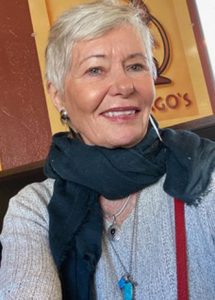
The caring science approach in nursing is on the rise, said Jean Watson, PhD, a distinguished professor emerita and dean emerita, University of Colorado Denver College of Nursing, as she addressed 90-plus Adelphi College of Nursing and Public Health (CNPH) attendees in an April 26 Zoom presentation.
 Dr. Watson, inducted in 2013 as a “Living Legend” by the American Academy of Nursing, its highest honor, pointed out that the caring science approach is growing. That’s in sharp contrast to the 1980s, when some in her conference audience audibly “gasped,” she said, when she mentioned that “healing” is a key part of nursing.
Dr. Watson, inducted in 2013 as a “Living Legend” by the American Academy of Nursing, its highest honor, pointed out that the caring science approach is growing. That’s in sharp contrast to the 1980s, when some in her conference audience audibly “gasped,” she said, when she mentioned that “healing” is a key part of nursing.
The American Nurses Association (ANA) official definition of the word “nursing” has only recently changed to reflect that. In 2022, Dr. Watson pointed out, the ANA for the first time included “caring” in its official definition. Previous mentions of diagnosis and treatment were supplemented with “facilitation of healing” and “alleviation of suffering through compassion,” she noted.
Dr. Watson’s 90-minute virtual lecture—on “Caring Science: Universals of Human Caring – Foundation of Nursing Discipline”—tied nicely into CNPH’s Nurses Week 2023 theme, “Cultivating Kindness: The Importance of Caring Science in Nursing.”
The theorist congratulated CNPH for being among just 10 schools nationwide to participate in the American Association of Colleges of Nursing (AACN) pilot training initiative to improve self-care among future nurses. CNPH Dean Deborah Hunt, PhD ’12, noted that funding from the AACN grant, generously provided by Johnson & Johnson, made Dr. Watson’s Nurses Week presentation possible.
“The pandemic awakened us that everything [and everyone] is connected,” Dr. Watson said. Her theory of caring focuses on nurses establishing a “transpersonal connection” with patients, one that allows nurses to then give healing care to the whole individual.
She added, “[Florence] Nightingale knew that nursing is a very spiritual practice. … We touch the heart and soul of humans and humanity.”
Caring Principles and Processes
Of the 10 Caritas Processes, or “universals of human caring,” she said the first involves self-care.
“Nursing exists to offer compassion,” she said. “We offer love as part of our caring. Nursing is not a doing profession, it’s a way of being.” From Nightingale’s time, nursing has involved “noninvasive approaches, such as auditory, visual, sensory, tactile. These are all practices that nurses have done across time, but we’d never named them.”
The three major principles of caring science, she said, are “the ethics of belonging, … face… and hand.” Belonging means “we are connected” and should not treat another person as “other” or an object. “The ethics of face” translates to “face-to-face connection.” She exclaimed, “What a paradox in the digital world!” Through “the ethics of hand,” she said, “we literally and metaphorically hold another’s life in our hands.”
Many hospitals today measure patient care with the inclusion of caring-related scores, developed via patient surveys.
“All of this brings love back into nursing and healthcare and science,” Dr. Watson said, and gives “new meaning and purpose to nurses and nursing” that are consistent with the ANA’s new caring-oriented definition. She observed, “It’s almost as if the profession of nursing and the ANA are catching up with the discipline.”
Expanding Caring Principles Beyond Nursing
During the Q&A portion, it became clear that CNPH attendees have been expanding Dr. Watson’s caring principles beyond career nurses and healthcare settings to encompass novice nurses and everyday life.
Kattiria Gonzalez, PhD, CNPH assistant professor, who just got a Caritas coach certificate from the Watson Caring Science Institute, said she has applied those mindfulness concepts to her personal training practice.
“Nurses can create a culture of caring themselves” by putting these principles into practice, Dr. Watson said. CNPH seniors Rebecca Mangal and Maya Budhram said that they intend to incorporate her ideas to improve high-pressure hospital settings in which they may work.
The session had a bit of an international feel once Dr. Watson mentioned that her lecture was originating from Mexico and that the virtual attendees included Japan-based CNPH alumna Michiko Tomura, PhD ’19—who has helped translate into Japanese the work of Dr. Watson.
Dr. Watson said she has worked with Kaiser Permanente, Cedar Sinai, Stanford Health Care and some veterans administration hospitals on applying her caring science principles.
Jacqueline Brandwein, CNPH clinical associate professor, added that NYC Health + Hospitals/Elmhurst’s NICU unit has utilized these principles to help parents cope with the loss of their babies.
Dr. Watson even suggested that these principles can be implemented through “a DEI lens,” for instance, as she has done in her work with Stanford Health Care.
At the University of Colorado, she held the nation’s first endowed Chair in Caring Science for 16 years. Founder of the original Center for Human Caring in Colorado, Dr. Watson is also a fellow of the American Academy of Nursing and past president of the National League for Nursing.
Dr. Watson also authored or co-authored more than 30 books on caring—including Nursing: The Philosophy and Science of Caring and Unitary Caring Science, with both covers featuring the lotus, the symbol of her Watson Institute.